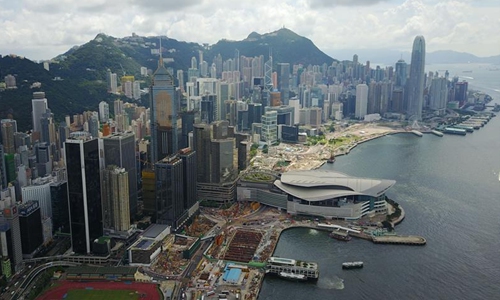Central govt liaison office’s authority to supervise implement of Basic Law in HK unshakable
By Chen Qingqing and Yang Sheng Source:Global Times Published: 2020/4/21 14:22:59

An aerial view of Hong Kong. Photo: Xinhua
To rebut the Western media and Taiwan separatists, who are hyping groundless accusations about the Chinese central government's authority to supervise the implementation of the Basic Law in the Hong Kong Special Administrative Region (HKSAR), multiple Chinese mainland departments in charge of relevant affairs and the chief executive of Hong Kong reaffirmed their stances on Tuesday.
Experts noted that the authority of the central government agencies is unshakable in Hong Kong, no matter what interventions foreign forces undertake in the future.
The Hong Kong and Macao Affairs Office of the State Council and the Chinese central government's liaison office in Hong Kong represent the central authority in the city, and they are authorized by the central government to handle Hong Kong affairs and have the right and responsibility to supervise the implementation of the Basic Law, Carrie Lam, chief executive of the HKSAR government, said on Tuesday morning.
Lam clarified and emphasized the roles of the two institutions set up by the central government in the HKSAR, after revised government press releases over the weekend caused questioning by the opposition over their roles in the city. Experts noted that the supervisory power of the central government's liaison office in Hong Kong cannot be questioned.
The Hong Kong and Macao Affairs Office of the State Council said on Tuesday that if there is a situation that seriously affects the comprehensive and accurate implementation of the "one country, two systems" policy and the Basic Law, or harms the fundamental interests of the Chinese mainland and the HKSAR, the central government must intervene, including stating its position and attitude in due course, and correcting it according to law.
On the issue of pan-democratic lawmakers recently paralyzing the legislature with filibustering tactics, the chief executive said: "Whether it's on the constitutional system, the HKSAR government or daily operations, the liaison office has the right to speak because it represents the central government and can also make a point. It is the right and obligation of the central organization in Hong Kong," she said, according to local media reports.
Amid the coronavirus pandemic, the recent arrests of some figures from the opposition camp - in addition to discussion sparked by the Hong Kong and Macao affairs office and the liaison office - are being interpreted by some Western media outlets as a move of the central government to erode the city's so-called freedom.
Chinese experts on Hong Kong affairs clarified that the recent arrest of the riot leaders, who are from the opposition camp, including Apple Daily founder Jimmy Lai Chee-ying and Hong Kong barrister Martin Lee Chu-ming, sent a clear message that crossing legal boundaries, endangering the rule of law and challenging the "one country, two systems" principle, will not be tolerated.
Following month-long riots inflamed by the opposition camp and riot leaders like Lai and Lee, more calls to pass Article 23 have emerged in Hong Kong and the mainland.
Lai accepted foreign aid to incite radical social movements in Hong Kong and subvert the Basic Law, Tian Feilong, associate professor at Beihang University in Beijing, told the Global Times. However, he has been at large due to the absence of Article 23 legislation and judicial omission.
The opposition groups in Hong Kong have challenged the "one country, two systems" principle time and again, and Lam's latest reiteration is believed to be a sign that the liaison office's supervisory power cannot be questioned, and that the central government will strengthen its governance and relevant plans in the future, which has nothing to do with "interference" in the city's affairs, as the opposition called it.
Due to the strengthening law enforcement of the Hong Kong police against foreign proxies in Hong Kong and separatists who are responsible for the riots in the city, the anti-government forces have felt pressure and that's why they raised groundless accusations to challenge the central government's authority, but in fact their attempts would be useless, said Li Xiaobing, a Hong Kong studies expert at Nankai University in Tianjin.
"The Constitution of the People's Republic of China and the Basic Law of HKSAR have authorized the central government to supervise the HKSAR government to implement the Basic Law, so the authority is unshakable. If anyone, whether foreign forces or local separatists, dares to further challenge it and even keeps conducting illegal activities in the future, law enforcement will also be strengthened to deal with them," Li noted.
Hong Kong riot leaders also have close connections with Taiwan's separatist Democratic Progressive Party (DPP), and observers noted the DPP of Taiwan also sponsored many Hong Kong separatists to make trouble in the HKSAR last year to challenge the unification of China, so the Taiwan authorities of the DPP also voiced opposition against the Chinese mainland's authority in Hong Kong.
Zhu Fenglian, spokesperson of the State Council Taiwan Affairs Office, said on Tuesday that "We warned Taiwan separatist authorities of the DPP, that playing political tricks to interrupt Hong Kong affairs is doomed to fail."
She made the remarks to rebut the DPP's accusation against the Hong Kong Police Force's law enforcement efforts to arrest riot leaders.
The act by the DPP showed its separatist nature of interrupting Hong Kong affairs to gain political benefits, she noted.
Newspaper headline: Central govt agencies’ authority in HK ‘unshakable’